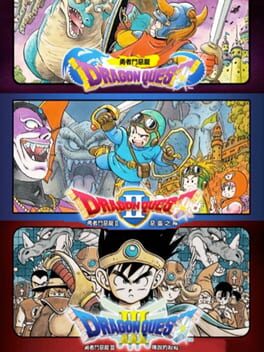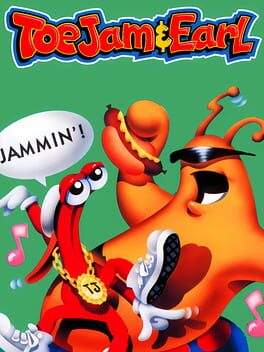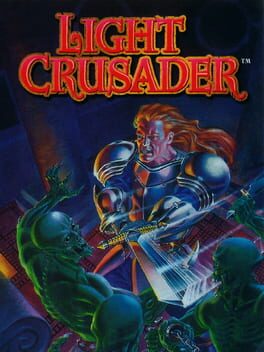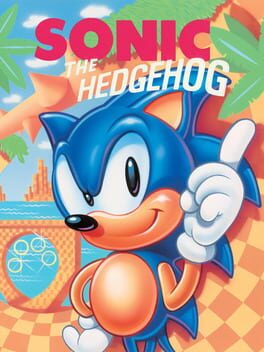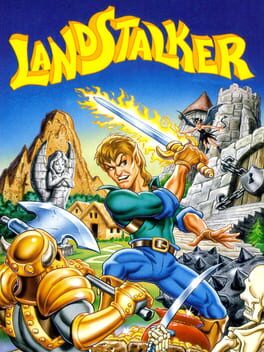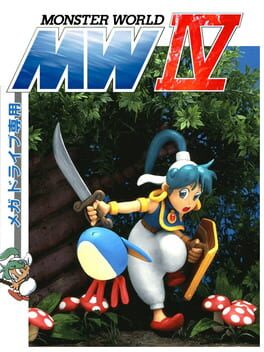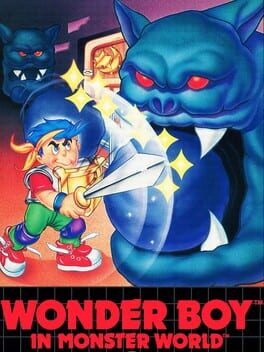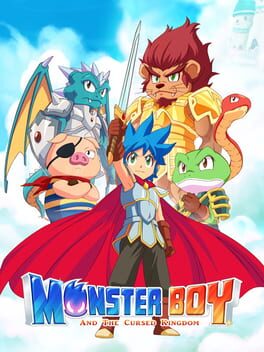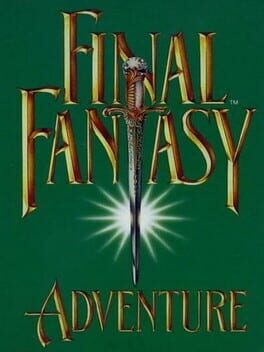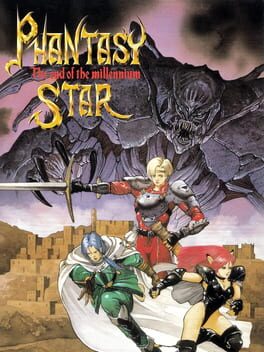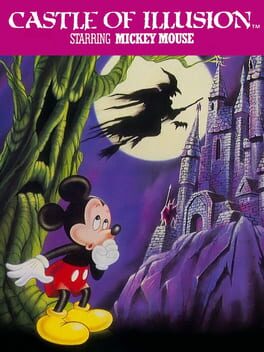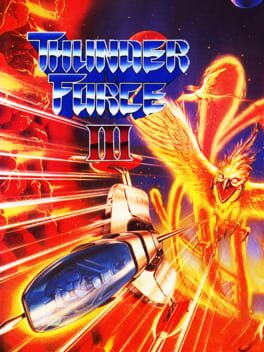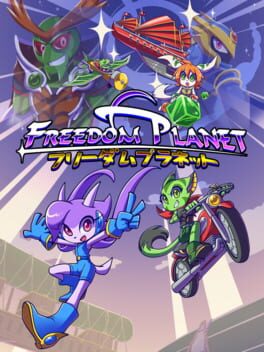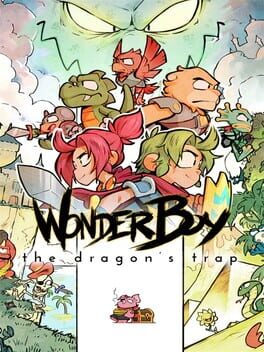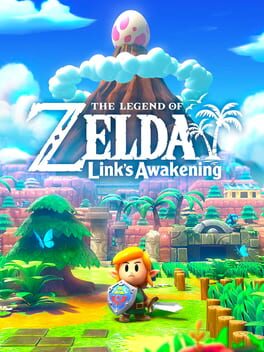GhaleonEB
BACKER
My first Dragon Quest games. Enjoyed seeing the roots of a the series, and I loved the turn-based combat and heavy exploration. The games offered a consistent but usually fair challenge and a high level of discovery. Learning how the games interconnected was neat.
These ports are not very good, a smooshed up mix of pixel art for backgrounds and character art from a discount mobile FTP game, so probably not the idea introduction to the series. But the core games were there, and they are great.
These ports are not very good, a smooshed up mix of pixel art for backgrounds and character art from a discount mobile FTP game, so probably not the idea introduction to the series. But the core games were there, and they are great.
1991
I had forgotten just how surrealistic TJ&E is. The humans are all parodies of we earthlings - and often quite barbed parodies at that - but the world design is rather trippy with the floating landmasses and paths. Less an action game than an exploration-heavy roguelike, particularly in random world mode, this one is all about vibing to the great soundtrack, exploring at a careful, deliberate pace and taking measured risks, whether opening presents or choosing to head up to the next level feeling unprepared. Surprisingly difficult, it was very fun to revisit a childhood favorite and find the game design and style both hold up well. A weird game executed beautifully.
Played on Genesis Mini console, in single-player fixed world mode.
Played on Genesis Mini console, in single-player fixed world mode.
1995
I wanted to like this more than I did. Light Crusader is basically a focused dungeon crawl, a game in which we hack, explore and puzzle our way through one giant labyrinth. I love those kind of games. But I think the usually reliable Treasure erred in the "realistic" art style that comes across as generic fantasy, and the combat is rather clumsy and unsatisfying. Some puzzles are too opaque, some bosses too simple. But for the most part, "serviceable" is how I'd describe this.
There are some good ideas in here, and I had a good time throughout, but the game doesn't really do anything to distinguish itself beyond the premise.
Played on Genesis Mini.
There are some good ideas in here, and I had a good time throughout, but the game doesn't really do anything to distinguish itself beyond the premise.
Played on Genesis Mini.
1991
I'd not played past the first two levels in a good 20+ years, so this was a treat to revisit. I was reminded how creative and kind of bonkers the game is, but also how the premise is a bait and switch.
For a character all about going fast, you gotta be methodical and careful after Green Hill Zone, and the final stage I basically inched through. Under the joyfully colorful veneer is a pretty difficult game, and an often mean one. Drowning, falling off the maps, enemies placed right in the middle of speedy stretches. Pointy, smashy things abound.
Not enough praise can be heaped on the surreal bonus stages (I maintain some very good drugs were involved in their conception) , the classic OST or the still superb graphics. Still, there's some clunkiness to the physics and some uneven pacing that took this down a few notches.
Even detached from the impact upon release and subsequent legacy, taken on its own, Sonic stands out as a superbly imaginative, challenging and fun game.
Replayed on Genesis Mini.
For a character all about going fast, you gotta be methodical and careful after Green Hill Zone, and the final stage I basically inched through. Under the joyfully colorful veneer is a pretty difficult game, and an often mean one. Drowning, falling off the maps, enemies placed right in the middle of speedy stretches. Pointy, smashy things abound.
Not enough praise can be heaped on the surreal bonus stages (I maintain some very good drugs were involved in their conception) , the classic OST or the still superb graphics. Still, there's some clunkiness to the physics and some uneven pacing that took this down a few notches.
Even detached from the impact upon release and subsequent legacy, taken on its own, Sonic stands out as a superbly imaginative, challenging and fun game.
Replayed on Genesis Mini.
This was the first isometric action game I'd played back when it came out. It was a brilliantly designed game then, and revisiting it with a new perspective only made it shine brighter.
Landstalker is an isometric action-RPG that strikes a perfect balance of exploration, action, platforming and puzzle solving, with a great story and set of characters. It's not afraid to be quite difficult at times, and to use its isometric viewpoint to up the challenge: hidden paths, difficulty aligning platforms, many a secret right at your feet if only you could see them. It's also unafraid to punish missteps with backtracking, sending you past a missed platform an onto the level below for the hajillionth time. But a zippy pace mean another shot at that jump is just a few moments away, and the tight controls with full air control are never at fault. Patience and perseverance are required, and this type of challenge may frustrate some.
The only notable flaw is in the sound: I do wish the enemies had at least a few more sound effects for getting hurt and defeated; the same few over and over is unfortunate. But repetitive yelps aside, the other effects are solid and the OST is very strong and catchy.
Landstalker's dungeons are a good illustration of how to leverage a handful of tools in an array of creative ways. Nigel can jump, swing his sword, carry objects and chuck them across a room. The steadily increasing complexity and creativity in how you have to deploy these abilities ramps up throughout the game in ways that constantly surprise and challenge, in dungeons that are sprawling and varied.
This is a masterclass of an isometric action-RPG.
Played on Genesis Mini.
Landstalker is an isometric action-RPG that strikes a perfect balance of exploration, action, platforming and puzzle solving, with a great story and set of characters. It's not afraid to be quite difficult at times, and to use its isometric viewpoint to up the challenge: hidden paths, difficulty aligning platforms, many a secret right at your feet if only you could see them. It's also unafraid to punish missteps with backtracking, sending you past a missed platform an onto the level below for the hajillionth time. But a zippy pace mean another shot at that jump is just a few moments away, and the tight controls with full air control are never at fault. Patience and perseverance are required, and this type of challenge may frustrate some.
The only notable flaw is in the sound: I do wish the enemies had at least a few more sound effects for getting hurt and defeated; the same few over and over is unfortunate. But repetitive yelps aside, the other effects are solid and the OST is very strong and catchy.
Landstalker's dungeons are a good illustration of how to leverage a handful of tools in an array of creative ways. Nigel can jump, swing his sword, carry objects and chuck them across a room. The steadily increasing complexity and creativity in how you have to deploy these abilities ramps up throughout the game in ways that constantly surprise and challenge, in dungeons that are sprawling and varied.
This is a masterclass of an isometric action-RPG.
Played on Genesis Mini.
1994
I've loved the Wonder Boy games since I was a kid, starting with the Sega Master System, but never got a chance to play this final entry until the Genesis Mini due to it never officially releasing in the US. MW IV is a delightful evolution in a series that was in a constant state of change from game to game, and features incredibly charming art and a catchy soundtrack. The OST uses a central theme and repurposes it into different styles to suit the various settings, which lends the game a cohesive feeling.
More linear than say, Wonder Boy III, with re-exploration focused on the town between levels, each stage has its own set of unique challenges, and Asha's companion Pepelogoo if often the key to navigating them. The steadily evolving relationship between Asha and Pepelogoo keeps the gameplay interesting stage to stage, and becomes incredibly endearing by the end of the story. And Pepelogoo is simply adorable.
I thought the game became less compelling toward the end for reasons that would constitute spoilers, and one late stage is a bit of a slog. And there's one level where the designers were clearly inspired by Sonic, and the pairing is not a great fit for how Asha moves. But those issues aside, this is a terrific action/platformer and a wonderful (not sorry) conclusion to the OG Wonder Boy/Monster World series.
Played on Genesis Mini.
More linear than say, Wonder Boy III, with re-exploration focused on the town between levels, each stage has its own set of unique challenges, and Asha's companion Pepelogoo if often the key to navigating them. The steadily evolving relationship between Asha and Pepelogoo keeps the gameplay interesting stage to stage, and becomes incredibly endearing by the end of the story. And Pepelogoo is simply adorable.
I thought the game became less compelling toward the end for reasons that would constitute spoilers, and one late stage is a bit of a slog. And there's one level where the designers were clearly inspired by Sonic, and the pairing is not a great fit for how Asha moves. But those issues aside, this is a terrific action/platformer and a wonderful (not sorry) conclusion to the OG Wonder Boy/Monster World series.
Played on Genesis Mini.
Despite Wonder Boy III The Dragon's Trap being one of my favorite games on the SMS, I somehow didn't play this follow up. It's a direct evolution of the series along action-RPG lines, continuing the series mix of side-scrolling puzzle solving, exploration and action.
The size of the world has expanded to include multiple towns with more space for varied environments between them, all of which feature unique gameplay elements and visual styles. The boss fights are much improved - and more challenging - over WBIII, making defeating them feel like an accomplishment. As with the rest of the series, the sandtrack is another highlight.
The gameplay is on the more sedentary side of the spectrum, with a moderate movement speed that caters to deliberate, careful play rather than frenetic action.
I found a few of the dungeons challenging for the wrong reasons - one in particular is a made of nearly identical passageways and doors that warp you around them that require complex weaving to navigate (I took to some graph paper to diagram it out). And the final boss serves as a big plot twist (yay) and a horrible gameplay experience (boo!).
But on the whole this a very fun, challenging action-RPG that is much more fleshed out and feature-rich that earlier games in the series. If you are wanting to discover what the Wonder Boy games are all about, this is a great place to start.
Played on Genesis Mini.
The size of the world has expanded to include multiple towns with more space for varied environments between them, all of which feature unique gameplay elements and visual styles. The boss fights are much improved - and more challenging - over WBIII, making defeating them feel like an accomplishment. As with the rest of the series, the sandtrack is another highlight.
The gameplay is on the more sedentary side of the spectrum, with a moderate movement speed that caters to deliberate, careful play rather than frenetic action.
I found a few of the dungeons challenging for the wrong reasons - one in particular is a made of nearly identical passageways and doors that warp you around them that require complex weaving to navigate (I took to some graph paper to diagram it out). And the final boss serves as a big plot twist (yay) and a horrible gameplay experience (boo!).
But on the whole this a very fun, challenging action-RPG that is much more fleshed out and feature-rich that earlier games in the series. If you are wanting to discover what the Wonder Boy games are all about, this is a great place to start.
Played on Genesis Mini.
If you have never played any of the Wonder Boy / Monster World games, then Monster Boy is merely a vividly colorful, beautifully animated metroidvania with a long quest, tons of varied areas, great puzzles and action, charming characters, fun abilities and a killer soundtrack.
But if you have played the prior games, Monster Boy is all that plus richly realized love letter to every game in the series, packed end to end with homages and references to the earlier games, right down to new versions of nearly every classic tune from the series, plus a ton of original tracks from an array of great composers, including some banging tracks from my personal favorite game composer, Yuzo Koshiro. I'll never forget the feeling I had when the delightful new rendition of the Side-crawler's Dance (the beach theme from Wonder Boy III) started playing at the beginning. Or the delightfully frenetic running animation of pig-boy in a wind-swept field under the sun while euphorically joyful music jams. Or the hilarious prison escape sequence, solving the big secret in the volcano, or the series of cascading epiphanies that result in clearing the haunted mansion.
A beautiful love-letter to one of my favorite series, it's one of those games that feels like it was made just for me. Monster Boy is everything I love about videogames.
But if you have played the prior games, Monster Boy is all that plus richly realized love letter to every game in the series, packed end to end with homages and references to the earlier games, right down to new versions of nearly every classic tune from the series, plus a ton of original tracks from an array of great composers, including some banging tracks from my personal favorite game composer, Yuzo Koshiro. I'll never forget the feeling I had when the delightful new rendition of the Side-crawler's Dance (the beach theme from Wonder Boy III) started playing at the beginning. Or the delightfully frenetic running animation of pig-boy in a wind-swept field under the sun while euphorically joyful music jams. Or the hilarious prison escape sequence, solving the big secret in the volcano, or the series of cascading epiphanies that result in clearing the haunted mansion.
A beautiful love-letter to one of my favorite series, it's one of those games that feels like it was made just for me. Monster Boy is everything I love about videogames.
A Zelda-like for the Gameboy, I thought the game holds up very well. Highlights include a catchy and surprisingly rich soundtrack; there's something I've always enjoyed about the echo-laden music on the Gameboy and it's put to good use here (the title music is great). Creative and often challenging boss fights and a pretty sprawling quest given the platform round out a fun old-school action-RPG.
On the downside, some of the puzzles are rather opaque, the kind of thing Nintendo would add to games from the era to send people seeking out Nintendo Power issues (that figure eight clue in the desert made NO sense). And there are a few times when I felt the controls and overall maneuverability were not up to the task of dealing with the enemies being thrown at me.
All in all, there's not many surprises if you go in expecting an adventure heavily inspired by Zelda, but it has its own charms and is still worth playing. (It also, apparently, has nothing to do with Final Fantasy, outside of marketing.)
Played on the Collection of Mana on Switch.
On the downside, some of the puzzles are rather opaque, the kind of thing Nintendo would add to games from the era to send people seeking out Nintendo Power issues (that figure eight clue in the desert made NO sense). And there are a few times when I felt the controls and overall maneuverability were not up to the task of dealing with the enemies being thrown at me.
All in all, there's not many surprises if you go in expecting an adventure heavily inspired by Zelda, but it has its own charms and is still worth playing. (It also, apparently, has nothing to do with Final Fantasy, outside of marketing.)
Played on the Collection of Mana on Switch.
As heartbreaking as it's been for Sega to abandon the OG Phantasy Star series, it's hard to imagine a better send-off for it. Phantasy Star IV somehow integrates the story threads from all three preceding games - with a particular focus on the beloved first and second - into a cohesive story, and then builds upon that story to a tremendous climax and satisfying conclusion.
The story is sprawling and filled with adventure, tragedy, romance and a strong feeling of foreboding as as the depth of the threat Algo is under becomes clear. The cinema scenes still pop with great art panels, writing and pacing, and there are a couple of real gut-punch story developments.
As a fan of the earlier games, it's a lot of fun to revisit this and see how well this game references them, from characters and locations to remixes of classic PS1 dungeon themes. But beyond all the references, this is a rock-solid RPG with a well designed world, long and engaging quest, great characters and a steady challenge throughout.
One of the very best Genesis games and among the best RPGs of the era. Still holds up brilliantly.
Played on Genesis Mini.
The story is sprawling and filled with adventure, tragedy, romance and a strong feeling of foreboding as as the depth of the threat Algo is under becomes clear. The cinema scenes still pop with great art panels, writing and pacing, and there are a couple of real gut-punch story developments.
As a fan of the earlier games, it's a lot of fun to revisit this and see how well this game references them, from characters and locations to remixes of classic PS1 dungeon themes. But beyond all the references, this is a rock-solid RPG with a well designed world, long and engaging quest, great characters and a steady challenge throughout.
One of the very best Genesis games and among the best RPGs of the era. Still holds up brilliantly.
Played on Genesis Mini.
This is a classic platformer that I had always wanted to play, but never had the chance until I got the Genesis Mini. I knew it had great animation and fun controls, and it did. While not long, every level has quite a few secrets to discover and unique gameplay and obstacles to tackle; it's fairly bursting with great ideas all the way through. The game feels joyful to play from the start, and keeps that all the way through.
It's an interesting snapshot of the lifespan of the Genesis. This seems like one of the earliest titles to really start to show the promise of the system, in a way a prelude of the incredible action games that came in the next few years. As is, Castle of Illusion is a solid hop and bop platformer with beautiful animation and music, coming right before the true greats hit the system.
Played on Genesis Mini.
It's an interesting snapshot of the lifespan of the Genesis. This seems like one of the earliest titles to really start to show the promise of the system, in a way a prelude of the incredible action games that came in the next few years. As is, Castle of Illusion is a solid hop and bop platformer with beautiful animation and music, coming right before the true greats hit the system.
Played on Genesis Mini.
1990
This is still my favorite shooter on the Genesis, and there's a whole lotta competition on the system. TFIII is one of those games where everything comes together perfectly to create something greater than the parts. The graphics are detailed with great parallax and animation; the soundtrack is an all-time great that I still listen to regularly (it recently got a CD re-release in Japan BTW); the controls are perfect; the action intense but fair, the challenge rising steadily but never becoming crushing.
It's all integrated into a vibe that is slick as hell. The level transitions are smooth and satisfying, boss fights emerge with a claxon warning and each with unique, jamming tunes. Weapon switching is fast, which is good because mastering the game means learning to do so on the fly rapidly. You can likewise change speeds instantly, and often need to in order to navigate tight passages. Even the UI is well-designed, doing its job efficiently and staying out of the way.
The levels are richly varied in design, scrolling all sorts of directions and speeds, and even the requisite "the level is fighting a giant ship" mission is done exceptionally well. The Hades mission and Orn bases are standouts, with the latter having one of my favorite soundtracks in any game.
The missing half star is because the bosses were unfortunately not balanced well - they all have nearly no health and die quickly even if you have little firepower, but some go down in low single digit seconds if you reach them powered up. (An issue fixed and then some in TF IV.) Still, this is a masterpiece right on through.
Played on Genesis Mini.
It's all integrated into a vibe that is slick as hell. The level transitions are smooth and satisfying, boss fights emerge with a claxon warning and each with unique, jamming tunes. Weapon switching is fast, which is good because mastering the game means learning to do so on the fly rapidly. You can likewise change speeds instantly, and often need to in order to navigate tight passages. Even the UI is well-designed, doing its job efficiently and staying out of the way.
The levels are richly varied in design, scrolling all sorts of directions and speeds, and even the requisite "the level is fighting a giant ship" mission is done exceptionally well. The Hades mission and Orn bases are standouts, with the latter having one of my favorite soundtracks in any game.
The missing half star is because the bosses were unfortunately not balanced well - they all have nearly no health and die quickly even if you have little firepower, but some go down in low single digit seconds if you reach them powered up. (An issue fixed and then some in TF IV.) Still, this is a masterpiece right on through.
Played on Genesis Mini.
2014
Freedom Planet is a mostly excellent platformer. I loved the giant, sprawling levels and how richly the game rewards exploring them. The visuals are wonderful, with great character designs and tons of fun details in the colorful art.
Freedom Planet's roots as a Sonic fan game are on display, but that's not a bad thing as it's got a very strong personality of its own. In particular, the story and characters are very strong and memorable. The story gets a bit heavier than I expected given the early tone, but it sets the stakes well.
Lastly, the soundtrack is an all-time great. I picked it up on Bandcamp and listen to it regularly, just a joyful assortment of catchy tunes and fun instrumentation. Each paired stage featuring the same theme but remixed was a great choice.
The boss fights are the weakest aspect of the game, as I found they contributed to very uneven pacing. Most were simply not very fun to fight and ground the game to a halt. If the game excluded most of them I'd have enjoyed it more. I hope this aspect is improved in the sequel.
Played through the as Lilac campaign. Worth noting, every character has some unique levels, so there's more to find on a replay.
Freedom Planet's roots as a Sonic fan game are on display, but that's not a bad thing as it's got a very strong personality of its own. In particular, the story and characters are very strong and memorable. The story gets a bit heavier than I expected given the early tone, but it sets the stakes well.
Lastly, the soundtrack is an all-time great. I picked it up on Bandcamp and listen to it regularly, just a joyful assortment of catchy tunes and fun instrumentation. Each paired stage featuring the same theme but remixed was a great choice.
The boss fights are the weakest aspect of the game, as I found they contributed to very uneven pacing. Most were simply not very fun to fight and ground the game to a halt. If the game excluded most of them I'd have enjoyed it more. I hope this aspect is improved in the sequel.
Played through the as Lilac campaign. Worth noting, every character has some unique levels, so there's more to find on a replay.
This is a loving remake to one of my favorite games ever, Wonder Boy III: The Dragon's Trap on the Sega Master System. I'd played that game to death when I was a kid, and still periodically revisit it.
As a remake, it is very smartly designed. Fully remade with gorgeous hand-drawn animation and backgrounds, the bones of the game are none the less very faithful the original, with a few tweaks. The game has a toggle that can switch between the new, beautifully hand-drawn art and the original SMS pixel art, showing both how faithful the remake is and how clever many of the visual updates are. There's also a toggle for the music and sound, allowing combinations of retro graphics and/or sound, rather than all or the other. (I enjoy the original chiptunes a great deal, so I play with the new graphics and OG sound.)
The overall adventure is still the same, hopping from one animal form to another in order to unwind a curse that is put upon the titular boy (or girl, in this version! progress!) in the intro. The gameplay and world design holds up, with the only major indicator that of its roots as an 8-bit game being the decidedly horizontal level design.
There are some new ideas here, as while the original game had many secrets to find, this remake adds a few more, namely in the way the stones work and are found, leading to some of the few world design updates. These new areas have a very different feel than the OG game, but still integrate into it well.
I do wish saving worked a bit more like how it did in the original, and dying did so as well. And while they did add a password feature to mimic the original after fan requests, it's buried in menus and very counterintuitive to use. The world design is relatively simple compared to later metroidvania games, but as a whole it fits together beautifully.
All in all this is a great version of a great game and I'm really glad it exists. The modern return of Wonder Boy has been a lot of fun to experience, as a longtime fan of the series.
As a remake, it is very smartly designed. Fully remade with gorgeous hand-drawn animation and backgrounds, the bones of the game are none the less very faithful the original, with a few tweaks. The game has a toggle that can switch between the new, beautifully hand-drawn art and the original SMS pixel art, showing both how faithful the remake is and how clever many of the visual updates are. There's also a toggle for the music and sound, allowing combinations of retro graphics and/or sound, rather than all or the other. (I enjoy the original chiptunes a great deal, so I play with the new graphics and OG sound.)
The overall adventure is still the same, hopping from one animal form to another in order to unwind a curse that is put upon the titular boy (or girl, in this version! progress!) in the intro. The gameplay and world design holds up, with the only major indicator that of its roots as an 8-bit game being the decidedly horizontal level design.
There are some new ideas here, as while the original game had many secrets to find, this remake adds a few more, namely in the way the stones work and are found, leading to some of the few world design updates. These new areas have a very different feel than the OG game, but still integrate into it well.
I do wish saving worked a bit more like how it did in the original, and dying did so as well. And while they did add a password feature to mimic the original after fan requests, it's buried in menus and very counterintuitive to use. The world design is relatively simple compared to later metroidvania games, but as a whole it fits together beautifully.
All in all this is a great version of a great game and I'm really glad it exists. The modern return of Wonder Boy has been a lot of fun to experience, as a longtime fan of the series.
This was the first Zelda game I'd ever played, and it was a delightful way to start. The art style is really nice, cute and subtly stylish; the overall aesthetic is just kinda warm and comfy. Everything feels just right, from the gentle music to the controls.
The overworld is not huge, but it's a masterclass in efficiency: every inch of the map has a purpose, and sometimes more than one. I must have zig-zagged the island hundreds of times and was never boring due to the tight design and efficient use of space and shortcuts. Link's Awakening effortlessly rewards exploration and experimentation from the very beginning on thorough the end.
Not especially difficult, but satisfying none the less to clear dungeons, progress through the overworld and uncover secrets. I particularly enjoyed toting the shovel everywhere digging holes all over the island, and the fishing mini-game.
The dungeon maker activity is sadly very limited and not particularly enjoyable; finding blocks to unlock new parts of it was more fun than actually using it. But aside from that? This is a nearly perfect action-RPG and a really great introduction to Zelda. I've played games influenced by the early Zelda games all my life, but never the OG.
By the end, I found myself sad that it was drawing to a close. I really like these characters, and the world they populated was one I didn't want to leave. I suppose that's the ultimate success measure of an RPG: it created a world that I missed when I left it. Wonderful game I look forward to replaying.
The overworld is not huge, but it's a masterclass in efficiency: every inch of the map has a purpose, and sometimes more than one. I must have zig-zagged the island hundreds of times and was never boring due to the tight design and efficient use of space and shortcuts. Link's Awakening effortlessly rewards exploration and experimentation from the very beginning on thorough the end.
Not especially difficult, but satisfying none the less to clear dungeons, progress through the overworld and uncover secrets. I particularly enjoyed toting the shovel everywhere digging holes all over the island, and the fishing mini-game.
The dungeon maker activity is sadly very limited and not particularly enjoyable; finding blocks to unlock new parts of it was more fun than actually using it. But aside from that? This is a nearly perfect action-RPG and a really great introduction to Zelda. I've played games influenced by the early Zelda games all my life, but never the OG.
By the end, I found myself sad that it was drawing to a close. I really like these characters, and the world they populated was one I didn't want to leave. I suppose that's the ultimate success measure of an RPG: it created a world that I missed when I left it. Wonderful game I look forward to replaying.
